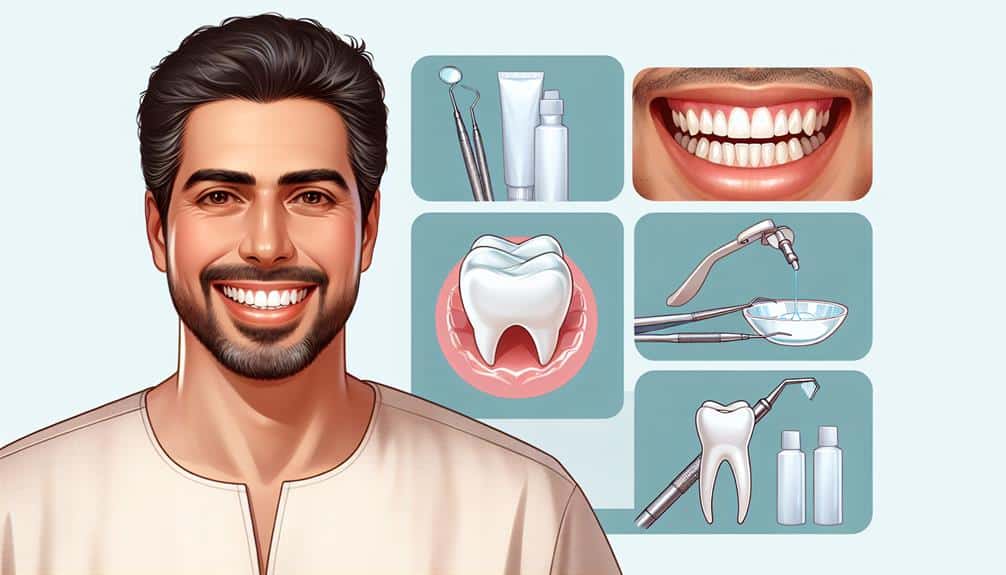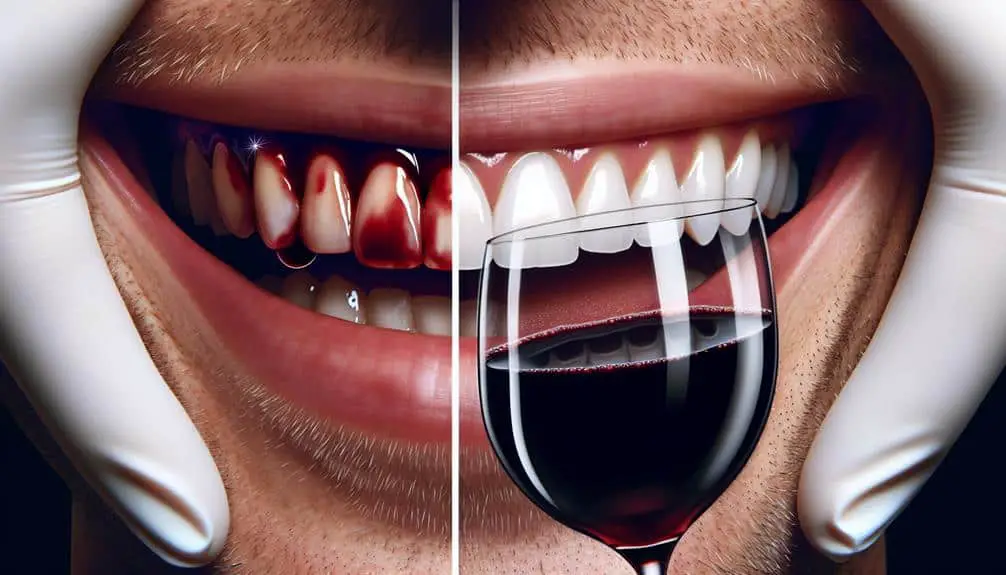For brighter teeth as a smoker, consider professional whitening treatments like laser sessions for quick, enamel-safe results. At-home kits with peroxide ingredients offer an affordable alternative. Use whitening toothpaste daily and follow with a hydrogen peroxide mouthwash. Try oil pulling with coconut oil and adjust diet to include crunchy fruits and vitamin C-rich foods to help scrub and reduce stains. Dairy products and green tea can strengthen enamel and freshen breath effectively. Remember, these targeted solutions can greatly enhance your smile and oral health.
Key Points
- Professional whitening treatments like laser therapy provide quick and effective results.
- At-home whitening kits with active ingredients offer an affordable alternative.
- Use whitening toothpaste and mouthwash to maintain brightness.
- Try oil pulling with coconut oil for a natural oral hygiene remedy.
- Adjust diet by consuming crunchy fruits, vitamin C-rich foods, and dairy products for a brighter smile.
Professional Whitening Treatments
When seeking professional whitening treatments for brighter teeth, consult with a licensed dentist to discuss the most suitable options for your specific needs. One popular option in cosmetic dentistry is laser whitening treatments, which offer several benefits. Laser whitening is a quick and effective procedure that can greatly lighten teeth in just one session. The focused light energy activates the whitening agent on your teeth, providing immediate results without causing damage to the enamel. Additionally, laser whitening treatments are known for reducing sensitivity compared to other whitening methods, making it a comfortable choice for many individuals.
Before proceeding with any professional whitening treatment, it's crucial to evaluate a cost analysis. The price of cosmetic dentistry procedures like laser whitening can vary depending on the dentist's expertise, location, and the extent of treatment needed. While professional whitening treatments may have a higher initial cost compared to at-home kits, the benefits of faster results and expert supervision make them a worthwhile investment in achieving a brighter smile.
At-Home Whitening Kits
Consider exploring the effectiveness of at-home whitening kits to enhance the brightness of your teeth in the comfort of your own home. At-home whitening kits are a popular choice for individuals seeking a convenient and cost-effective way to whiten their teeth. These kits often contain whitening gel with active ingredients like hydrogen peroxide or carbamide peroxide, which help to break down stains on the teeth's surface.
When looking for at-home whitening kits, you may come across various options ranging from strips, trays, to pens. Some kits also include LED lights to enhance the whitening process. These kits provide a more affordable alternative to professional treatments and can be used at your convenience.
While at-home whitening kits can be effective, it's important to follow the instructions carefully to avoid any potential risks to your oral health. Additionally, for those interested in natural remedies or DIY techniques, there are also options available that use ingredients like baking soda or activated charcoal for teeth whitening. Before starting any whitening treatment, consulting with a dentist is recommended to make sure it's suitable for your dental health.
Whitening Toothpaste and Mouthwash
To further enhance the brightness of your teeth beyond at-home whitening kits, consider incorporating whitening toothpaste and mouthwash into your oral care routine. Whitening toothpaste often contains abrasive particles or chemicals that help to remove surface stains on teeth. Look for products that are recognized by dental associations and have been clinically proven to be effective. When using whitening toothpaste, it's important to follow proper brushing techniques. Brush gently in circular motions for about two minutes, ensuring you cover all tooth surfaces.
In addition to toothpaste, whitening mouthwash can also aid in maintaining a brighter smile. These mouthwashes often contain hydrogen peroxide or other whitening agents. Incorporating whitening mouthwash into your routine can help to reach areas that may be missed by brushing alone.
While using these products, consider any diet restrictions that may impact the effectiveness of whitening. Limiting foods and beverages that stain teeth, such as coffee, tea, and red wine, can help maintain the results of whitening products. By combining whitening toothpaste and mouthwash with proper brushing techniques, you can achieve a brighter smile and improve your overall oral hygiene.
Oil Pulling for Teeth Whitening
Incorporate oil pulling into your oral care routine for potential teeth whitening benefits. Oil pulling is a natural remedy that has been used for centuries to improve oral hygiene. The process involves swishing oil around in your mouth to remove bacteria, which can help whiten teeth by reducing plaque buildup and stains. Coconut oil is commonly used for oil pulling due to its antimicrobial properties, but other oils like sesame or sunflower can also be effective.
To try oil pulling for teeth whitening, simply take a tablespoon of your chosen oil and swish it around in your mouth for 15-20 minutes. Be sure not to swallow the oil, as it collects toxins and bacteria from your mouth during the swishing process. Afterward, spit the oil out into a trash can and rinse your mouth with water before brushing your teeth as usual.
While oil pulling can be a helpful addition to your oral hygiene routine, it's essential to remember that it isn't a replacement for regular brushing and flossing. Consistent use of oil pulling, alongside good oral hygiene practices, may contribute to a brighter smile over time.
Dietary Adjustments for Brighter Teeth
Making dietary adjustments can play a significant role in achieving brighter teeth and enhancing your overall oral health. Consuming healthy snacks like crunchy fruits and vegetables can help scrub away surface stains on your teeth. Foods rich in vitamin C, such as strawberries and oranges, can also aid in whitening by reducing plaque buildup. Additionally, dairy products like cheese and yogurt contain calcium and phosphates that strengthen enamel, protecting your teeth from discoloration.
Hydration habits are vital for maintaining a bright smile. Drinking water throughout the day helps wash away food particles and acids that can lead to staining and decay. Green tea is another excellent beverage choice as it contains compounds that can prevent bacteria growth in your mouth, promoting fresher breath and healthier teeth.
Frequently Asked Questions
Are There Any Natural Remedies or DIY Methods That Can Help Brighten Smokers' Teeth?
You can explore various natural remedies and DIY methods to brighten smokers' teeth. Home solutions like baking soda and hydrogen peroxide can help. Remember, preventive measures such as reducing smoking and maintaining good oral hygiene are key.
Can Smoking Cessation Improve the Effectiveness of Teeth Whitening Treatments?
Stopping smoking can greatly improve the efficiency of teeth whitening procedures. Nicotine replacement therapies can assist in this process. Regular dental checkups are essential for monitoring progress and ensuring ideal results. Take control of your oral health today!
Are There Any Specific Dental Hygiene Practices That Smokers Should Follow to Maintain Brighter Teeth?
For a radiant smile, consider tobacco alternatives and embrace whitening toothpaste techniques. Enhance your dental hygiene routine to combat the effects of smoking. Consistent care can help maintain brighter teeth despite tobacco use.
How Long Do the Effects of Professional Whitening Treatments Typically Last for Smokers?
To maintain the long-term results of professional whitening treatments as a smoker, you'll need to be diligent with maintenance. Lifestyle changes like quitting smoking and avoiding staining habits can help extend the brightness of your teeth.
Are There Any Specific Foods or Drinks That Smokers Should Avoid to Prevent Staining on Their Teeth After Whitening Treatments?
To prevent staining on your teeth after whitening treatments, avoid tea over coffee, as tea can lead to more discoloration. Opt for white wine instead of red wine, as red wine's deep pigments can contribute to staining.



